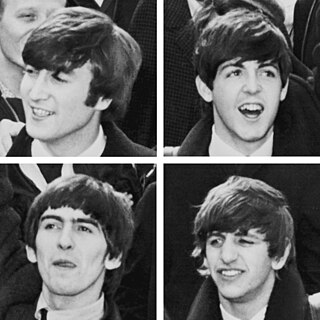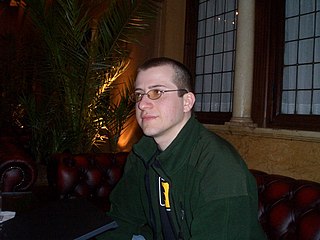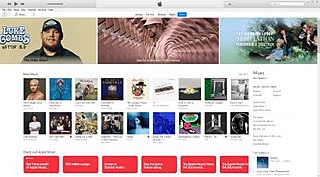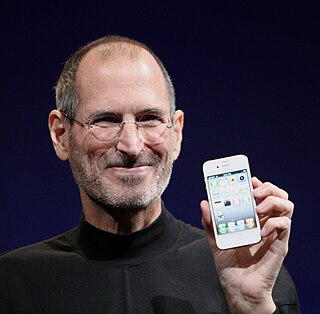Related Research Articles

The Beatles were an English rock band formed in Liverpool in 1960, comprising John Lennon, Paul McCartney, George Harrison and Ringo Starr. They are regarded as the most influential band of all time and were integral to the development of 1960s counterculture and the recognition of popular music as an art form. Rooted in skiffle, beat and 1950s rock 'n' roll, their sound incorporated elements of classical music and traditional pop in innovative ways. The band also explored music styles ranging from folk and Indian music to psychedelia and hard rock. As pioneers in recording, songwriting and artistic presentation, the Beatles revolutionized many aspects of the music industry and were often publicized as leaders of the era's youth and sociocultural movements.

Michael Robertson is the founder and former CEO of MP3.com, an Internet music site. In the years following his departure from MP3.com Robertson has launched several companies, including Linspire, SIPphone, MP3tunes, and Ajax13. He is also founder of OnRad.io, a search engine for radio and DAR.fm, a website for recording audio from internet radio.

The iPod is a discontinued series of portable media players and multi-purpose mobile devices designed and marketed by Apple Inc. The first version was released on November 10, 2001, about 8+1⁄2 months after the Macintosh version of iTunes was released. Apple sold an estimated 450 million iPod products as of 2022. Apple discontinued the iPod product line on May 10, 2022. At over 20 years, the iPod brand is the oldest to be discontinued by Apple.

Neil Stanley Aspinall was a British music industry executive. A school friend of Paul McCartney and George Harrison, he went on to head the Beatles' company Apple Corps.

Jon Lech Johansen, also known as DVD Jon, is a Norwegian programmer who has worked on reverse engineering data formats. He wrote the DeCSS software, which decodes the Content Scramble System used for DVD licensing enforcement. Johansen is a self-trained software engineer, who quit high school during his first year to spend more time with the DeCSS case. He moved to the United States and worked as a software engineer from October 2005 until November 2006. He then moved to Norway but moved back to the United States in June 2007.
Apple Records is a British record label founded by the Beatles in 1968 as a division of Apple Corps Ltd. It was initially intended as a creative outlet for the Beatles, both as a group and individually, plus a selection of other artists including Mary Hopkin, James Taylor, Badfinger and Billy Preston. In practice, the roster had become dominated by the mid-1970s with releases of the former Beatles as solo artists. Allen Klein managed the label from 1969 to 1973, then it was managed by Neil Aspinall on behalf of the Beatles and their heirs. Aspinall retired in 2007 and was replaced by Jeff Jones.

The iTunes Store is a digital media store operated by Apple Inc. It opened on April 28, 2003, as a result of Steve Jobs' push to open a digital marketplace for music. As of April 2020, iTunes offered 60 million songs, 2.2 million apps, 25,000 TV shows, and 65,000 films. When it opened, it was the only legal digital catalog of music to offer songs from all five major record labels.

Bonjour is Apple's implementation of zero-configuration networking (zeroconf), a group of technologies that includes service discovery, address assignment, and hostname resolution. Bonjour locates devices such as printers, other computers, and the services that those devices offer on a local network using multicast Domain Name System (mDNS) service records.
Sosumi is an alert sound introduced by Jim Reekes in Apple Inc.'s Macintosh System 7 operating system in 1991. The name is derived from the phrase "so, sue me!" because of a long running court battle with Apple Corps, the similarly named music company, regarding the use of music in Apple Inc.'s computer products.
FairPlay is a family of digital rights management (DRM) technologies developed by Apple Inc. for protecting videos, books and apps and historically for music.

Apple Corps Limited is a multi-armed multimedia corporation founded in London in January 1968 by the members of The Beatles to replace their earlier company and to form a conglomerate. The name is a pun for its pronunciation "apple core". Its chief division is Apple Records, which was launched in the same year. Other divisions included Apple Electronics, Apple Films, Apple Publishing and Apple Retail, whose most notable venture was the short-lived Apple Boutique, on the corner of Baker Street and Paddington Street in central London. Apple's headquarters in the late 1960s was at the upper floors of 94 Baker Street, after that at 95 Wigmore Street, and subsequently at 3 Savile Row. The last of these addresses was also known as the Apple Building, which was home to the Apple studio.

Allen Klein was an American businessman whose aggressive negotiation tactics affected industry standards for compensating recording artists. He founded ABKCO Music & Records Incorporated. Klein increased profits for his musician clients by negotiating new record company contracts. He first scored monetary and contractual gains for Buddy Knox and Jimmy Bowen, one-hit rockabillies of the late 1950s, then parlayed his early successes into a position managing Sam Cooke, and eventually managed the Beatles and the Rolling Stones simultaneously, along with many other artists, becoming one of the most powerful individuals in the music industry during his era.
The Beatles were an English rock band, active from 1960 until 1970. From 1962 onwards, the band's members were John Lennon, Paul McCartney, George Harrison and Ringo Starr. Their break-up is attributed to numerous factors, including: the strain of the Beatlemania phenomenon, the 1967 death of manager Brian Epstein, bandmates' resentment of McCartney's perceived domineering, Lennon's heroin use and his relationship with Yoko Ono, Harrison's increasingly prolific songwriting, the floundering of Apple Corps, the Get Back project, and managerial disputes.
The multinational technology corporation Apple Inc. has been a participant in various legal proceedings and claims since it began operation and, like its competitors and peers, engages in litigation in its normal course of business for a variety of reasons. In particular, Apple is known for and promotes itself as actively and aggressively enforcing its intellectual property interests. From the 1980s to the present, Apple has been plaintiff or defendant in civil actions in the United States and other countries. Some of these actions have determined significant case law for the information technology industry and many have captured the attention of the public and media. Apple's litigation generally involves intellectual property disputes, but the company has also been a party in lawsuits that include antitrust claims, consumer actions, commercial unfair trade practice suits, defamation claims, and corporate espionage, among other matters.
A moron in a hurry is a phrase that has been used in legal cases, especially in the UK, involving trademark infringement and passing off. Where one party alleges that another has infringed their intellectual property rights by offering for sale a product that is confusably similar to their own, the court has to decide whether a reasonable person would be misled by the defendant's trademark or the get-up of their product. It has been held that "if only a moron in a hurry would be misled" the case is not made out. Although this formulation addresses only fairly extreme instances of confusability, and says nothing about less clear examples, the phrase is sometimes referred to as a "test".
"Sue Me, Sue You Blues" is a song written by English musician George Harrison, released on his 1973 album Living in the Material World. Harrison initially let American guitarist Jesse Ed Davis record it for the latter's Ululu album (1972), in gratitude to Davis for his participation in the Concert for Bangladesh. When writing the song, Harrison drew inspiration from the legal issues surrounding the Beatles during the early months of 1971, particularly the lawsuit that Paul McCartney initiated in an effort to dissolve the band's business partnership, Apple Corps.
Jeff Jones is a music industry executive best known as the CEO of Apple Corps, the company founded by The Beatles. Jones was formerly an executive vice president at Sony/BMG, where he managed Sony's recorded catalogs, including repackaging classic albums.

The history of the iPhone development by Apple Inc. spans from the early 2000s to about 2010. The first iPhone was released in 2007. By the end of 2009, iPhone models had been released in all major markets.
Microsoft has been involved in numerous high-profile legal matters that involved litigation over the history of the company, including cases against the United States, the European Union, and competitors.

The Beatles: Rock Band is a 2009 rhythm game developed by Harmonix, published by MTV Games, and distributed by Electronic Arts. It is the fourth installment in the Rock Band series and the first band-centric game. Centered on the English rock group the Beatles, the game features virtual portrayals of the four band members performing the songs throughout the band's history, including depictions of some of their famous live performances, as well as a number of "dreamscape" sequences for songs from the Abbey Road Studios recording sessions during the group's studio years. The game's soundtrack consists of 45 Beatles songs; additional songs and albums by the Beatles were made available for the game as downloadable content.
References
- 1 2 Salkever, Alex (30 September 2004). "John, Paul, George, Ringo ... and Steve?". Bloomberg BusinessWeek . ISSN 0007-7135. Archived from the original on 10 March 2007. Retrieved 14 September 2022.
- 1 2 Hormby, Tom (27 April 2014). "What's in a Name? Apple Corp vs. Apple Computer". Low End Mac . Archived from the original on 26 December 2021. Retrieved 14 September 2022.
- ↑ "History of Apple v Apple". BBC News . 8 May 2006. Archived from the original on 7 February 2007. Retrieved 3 February 2007.
- ↑ Miles, Barry (15 October 1998). Paul McCartney: Many Years from Now. Vintage-Random House. ISBN 978-0805052497. LCCN 98105657. OCLC 40284619. OL 7932279M.
- ↑ Borland, John; Fried, Ina (23 September 2004). "Apple vs. Apple: Perfect harmony?". CNET . Archived from the original on 12 June 2022. Retrieved 14 September 2022.
According to a recent court decision quoting the 1991 settlement agreement, the Beatles were given the right to use the Apple name wherever their songs were involved and on "any current or future creative works whose principal content is music." However, Apple Computer was allowed to use its brand on "goods or services...used to reproduce, run, play or otherwise deliver such content," as long as it was not on physical media such as a CD.
- ↑ Jardin, Xeni (24 March 2005). "Early Apple sound designer Jim Reekes corrects Sosumi myth". Boing Boing . Archived from the original on 1 June 2005. Retrieved 8 October 2013.
- ↑ Graves, Alice (11 December 2006). "Apple v Apple: What is at the core of The Beatles' Apple Records vs. Apple iPod ..." LegalZoom. Archived from the original on 12 March 2007. Retrieved 1 March 2007.
- ↑ Royal Courts of Justice (2004). "Judgment in Apple Corps Limited vs Apple Computer, Inc. - EWHC 768 (Ch) in Case No: HC-2003-C02428". courtservice.gov.uk. Archived from the original on 15 March 2005. Retrieved 8 October 2013.
- ↑ "Apple Giants Do Battle in Court". BBC News. 29 March 2006. Archived from the original on 10 March 2007. Retrieved 1 March 2007.
- ↑ Brandie, Lars (8 May 2006). "Apple Computer Triumphs in Beatles Case". Billboard .
- 1 2 Apple Corps Limited and Apple Computer, Inc., UKMr. Justice Mann (High Court5 August 2005). (archived on 2 April 2009)
- ↑ "Beatles lose court case against Apple Computer". BBC. 11 May 2006. Retrieved 29 January 2007.
- ↑ "Beatles lose Apple court battle". BBC News. 8 May 2006. Archived from the original on 5 February 2007. Retrieved 1 March 2007.
- ↑ "Apple Inc. and The Beatles' Apple Corps Ltd. Enter into New Agreement" (Press release). Apple Inc. 5 February 2007. Archived from the original on 7 February 2007. Retrieved 5 February 2007.
- ↑ Evans, Jonny (12 April 2007). "EMI, Apple Corps deal good news for iTunes?". MacWorld .
- ↑ Kreps, Daniel (14 November 2007). "McCartney Says Beatles Going Digital in '08, New Alice in Chains Album, Queens of the Stone Age Booted From Rehab Clinic". Rolling Stone. Archived from the original on 14 April 2010.
- ↑ "McCartney: Beatles Should Go Digital Next Year". Billboard. Archived from the original on 14 August 2010.
- ↑ "Beatles albums offered on iTunes". BBC News . 16 November 2010.